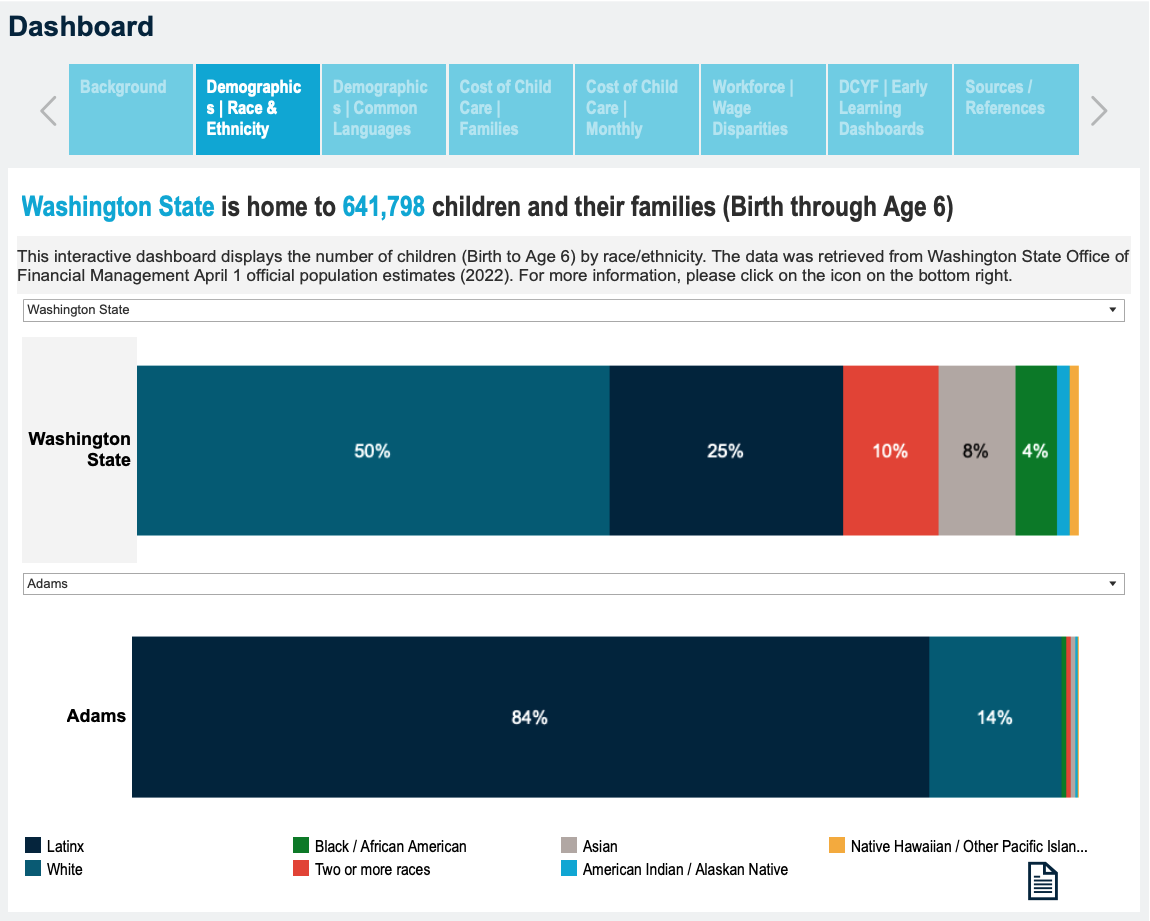The State of the Children Reports & Data Dashboard
The State of the Children Reports & Data Dashboard
OVERVIEW
Washington STEM’s Early Learning initiative was launched in 2018 based on the knowledge that 90% of brain development happens before age 5. However, until recently, there was limited data publicly available on early care and education in Washington. One of Washington STEM’s first collaborations in the early learning sphere was with Washington Communities for Children (WCFC) to produce the State of the Children regional reports. These reports provide data for 10 regions across the state and coupled with a new data dashboard added in 2023, have been important tools for early learning advocates—whether they be families, community-based organizations, or employers who want to support working parents— to demonstrate how investment in high-quality, culturally-responsive early care and education can impact a generation of learners.

Partnership
The first State of the Children (SOTC) reports were developed in 2020 in partnership with Washington Communities for Children (WCFC), a statewide network of 10 early learning coalitions representing some 600 organizations and individuals. WCFC’s early learning reports for the Northwest and Southwest regions of the state were the inspiration for Washington STEM’s ten State of the Children reports which provide region-specific demographic data, links to resources, and calculate the economic benefits of investing in early care and education. When it came time to update the report series in 2022, we responded to the early learning community’s request for more inclusive data and stories that reflect diverse communities in Washington. Our partners, WCFC put out a call with their networks inviting more diverse voices in the reports’ co-design and co-creation process so the reports better reflect community knowledge and experience. This partnership with WCFC was crucial to bringing voices of caregivers and child care providers into the two-page, data-rich reports.
Direct Support
The first State of the Children regional reports were written in 2020 by Washington STEM staff and WCFC regional leads. When it was time to update them two years later, we asked for feedback on how to improve the reports. The answer was greater community involvement in developing the reports. Towards this end, Washington STEM and WCFC invited 50+ caregivers, parents and child care providers from diverse ethnic and linguistic backgrounds to help shape the 2023 reports’ format and content. Over the course of six months, Washington STEM led a “co-design” process, meeting online each month and asking co-design participants to share their experiences and the barriers they faced when accessing early learning and care. They also received training on advocacy-focused storytelling and had time for networking to further strengthen their regional early learning coalitions.
The results of this process are a data dashboard and ten SOTC regional reports that provide data snapshots and stories from local families who struggled to find care, as well as from child care providers who managed to stay afloat financially using creativity and determination. The reports include links to resources and recommendations for improving statewide data collection on children with disabilities, those experiencing homelessness, children from immigrant families, and those who speak languages other than English at home.

Advocacy
Washington STEM published the first State of the Children reports in 2021 a few months before the legislature passed the Fair Start for Kids Act (FSFKA), a $1.1 billion investment in early care and education across Washington state. The SOTC reports provided lawmakers with demographic data on the need for child care and the real price of care in their regions.
Outside the legislative arena, the 2023 SOTC co-design process introduced new members to early learning advocacy networks across the state. This diverse group of 50+ co-design participants, infused the reports with perspectives that are often overlooked in child care data: from families with children with disabilities, immigrant families, and those speaking a language other than English at home. In addition to sharing their knowledge, they also received coaching from a Head Start Parent Ambassador on sharing one’s personal story in an advocacy context, such as giving testimony to a legislative committee. And finally, the Washington STEM and WCFC developed the Family-Friendly Workplace report, a SOTC companion report specifically for employers who are grappling with the lack of child care. This two-page, data-rich report highlights the significant economic impacts caused by a lack of child care, from lost revenue to absenteeism.
As we look ahead, Washington STEM will continue to work across-sectors to convene stakeholders, provide the relevant data, and source systems-level solutions to improve early care and education—the best investment we can make in our future.